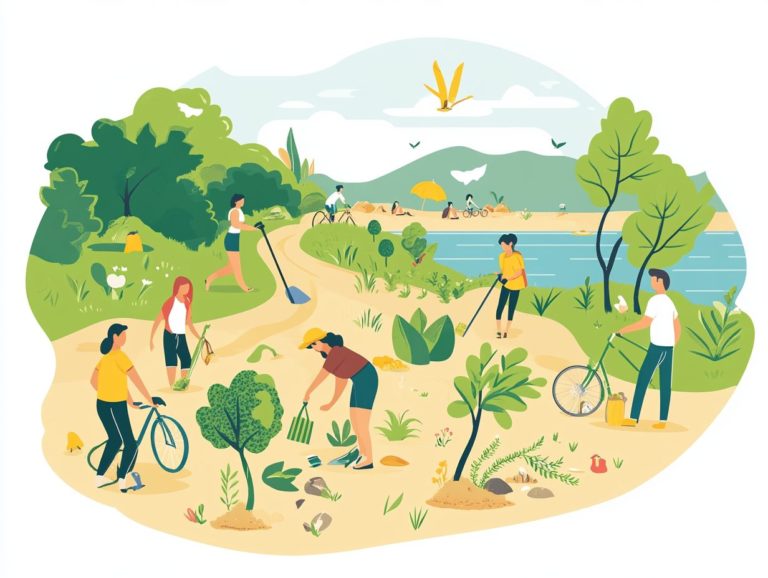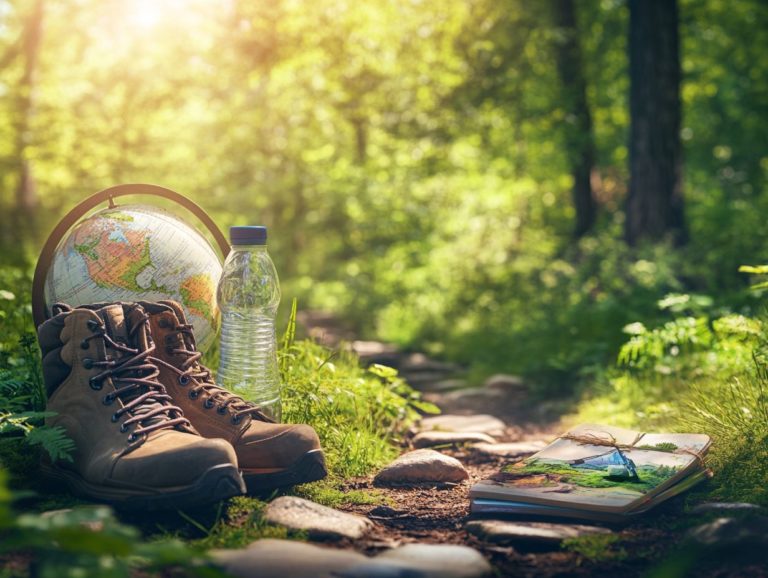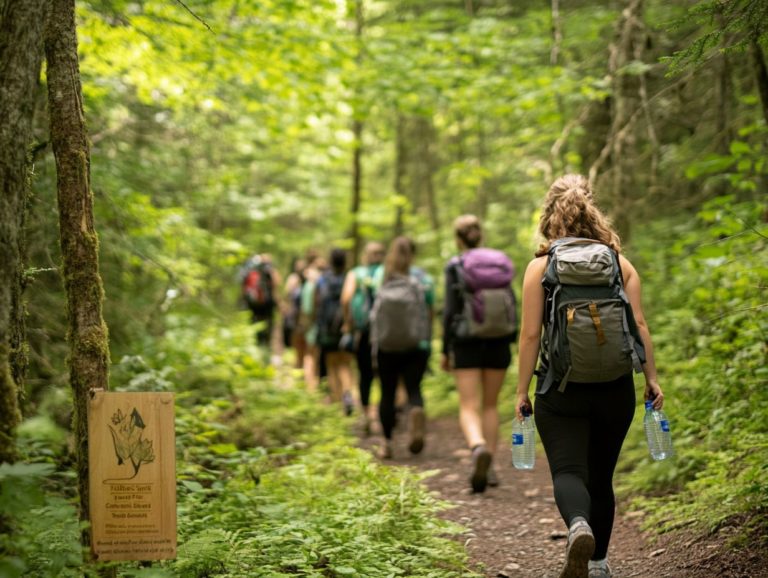What Impact Does Tourism Have on the Environment?
Tourism is a double-edged sword. It presents both great opportunities and major challenges for the environment.
It can fuel conservation efforts and boost local economies. However, it also risks environmental damage and pollution.
This exploration looks at the relationship between tourism and the environment. You’ll see its positive and negative impacts.
Discover strategies to reduce harm through sustainable tourism practices. Contemplate the future of this vital industry as we balance growth and preservation.
Join the journey to navigate these critical issues. Uncover solutions for nurturing a healthier planet with mindful travel.
Contents
- Key Takeaways:
- Positive Impacts of Tourism on the Environment
- Ways to Mitigate the Negative Effects
- Future of Tourism and the Environment
- Frequently Asked Questions
- What Impact Does Tourism Have on the Environment?
- How does tourism affect the local ecosystem?
- What are some ways that tourism can have a positive impact on the environment, especially in places like Costa Rica and Bali?
- How does transportation in tourism impact the environment, especially cruise ships and their greenhouse gases?
- What are the long-term consequences of unsustainable tourism on the environment?
- How can we reduce the negative environmental impacts of tourism?
Key Takeaways:
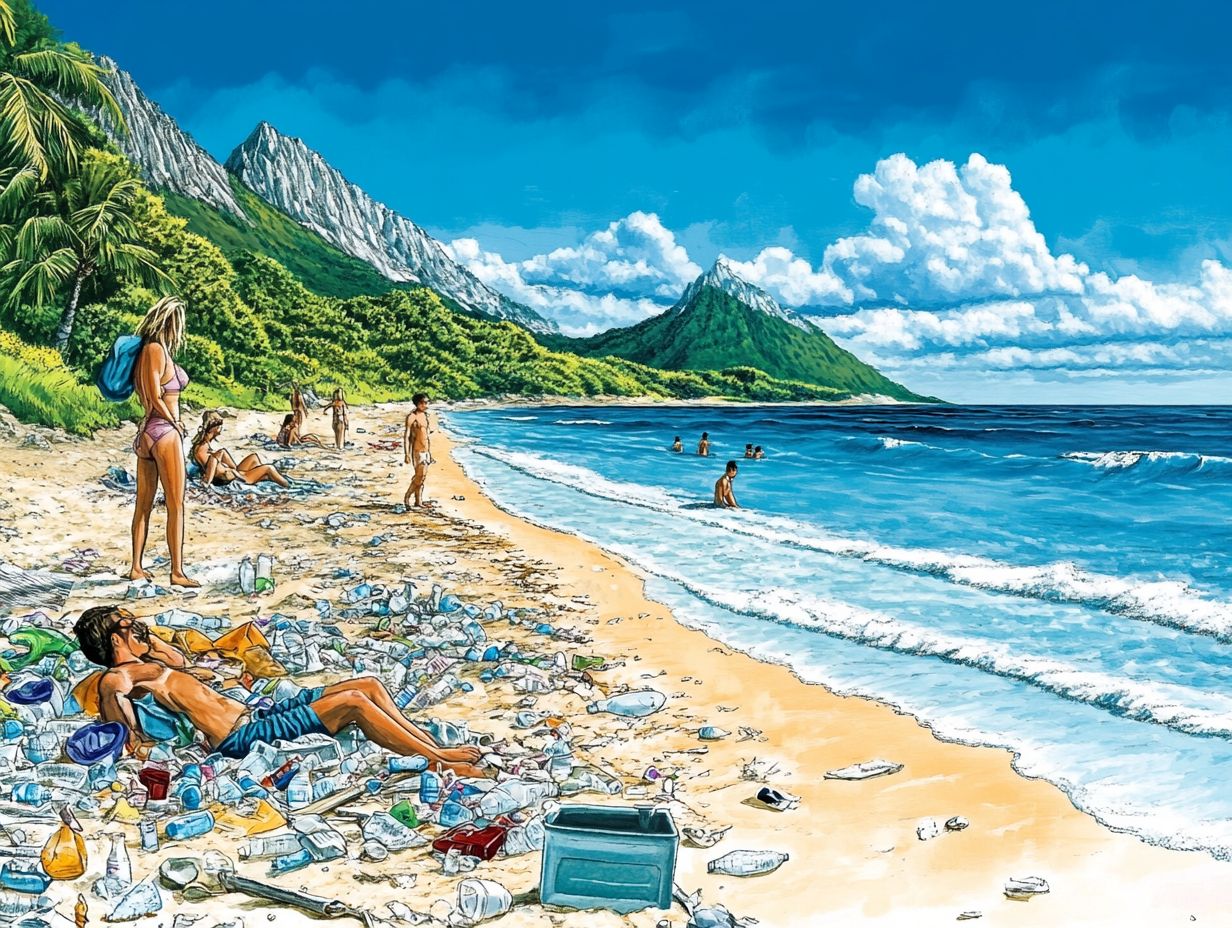
- Tourism can have both positive and negative impacts on the environment.
- It can support conservation efforts and local economies but can also lead to pollution.
- Sustainable practices are crucial to balance economic growth and environmental care.
Defining Tourism and its Growth
Tourism has transformed in recent decades. It has become a key economic force for many countries, especially those rich in natural resources and culture.
Your interest in travel is driven by better accessibility and technology. A growing love for eco-tourism promotes sustainable practices that benefit local communities.
This growth also brings challenges. Climate change and its impact on marine ecosystems highlight the urgent need for responsible tourism.
This vibrant sector offers diverse experiences. From thrilling adventure travel to cultural encounters and wellness retreats, each has unique opportunities and hurdles.
Statistics show that global tourism saw a rapid increase, with over 1.4 billion international arrivals in 2019. This underscores its importance for job creation and economic stability.
The rise in eco-tourism reflects a shift towards conscientious travel. It fosters conservation while appealing to environmentally-aware travelers.
However, climate change threatens destinations like the Maldives and the Great Barrier Reef. Rising sea levels and coral bleaching are becoming alarmingly common.
Immediate action is needed to preserve their beauty for future generations!
Positive Impacts of Tourism on the Environment
Tourism can bring remarkable benefits to the environment when done responsibly. It plays a crucial role in conservation and protects the variety of life in delicate ecosystems.
By supporting eco-tourism initiatives, you contribute to practices that not only preserve natural resources but empower local communities to combat environmental degradation.
Responsible tourism allows you to enjoy enriching activities while raising awareness about climate change. Together, let’s safeguard our marine ecosystems!
Conservation Efforts and Economic Benefits
Conservation efforts fueled by tourism yield significant economic advantages, allowing destinations like Santorini and Venice to capitalize on their inherent beauty and rich cultural heritage for sustainable development. These benefits go beyond mere financial gain; they cultivate a dedication to practices like reducing carbon emissions and harnessing renewable energy sources to reduce the carbon footprint linked to tourism activities.
By investing in conservation, regions can establish a mutual benefit where tourism revenue fuels additional preservation initiatives.
Take Costa Rica, for example, where eco-tourism generates over $3 billion annually, directly channeling funds into wildlife reserves and habitat restoration projects. Statistics reveal that for every dollar spent on eco-tourism, about 94 cents is reinvested into local conservation strategies. This approach not only protects endangered species but also gives power to local communities by providing jobs and fostering a sense of stewardship over their natural resources.
By engaging local populations in these initiatives, you can amplify awareness and advocacy for sustainability, ensuring that both tourism and conservation flourish in a harmonious balance.
Negative Impacts of Tourism on the Environment
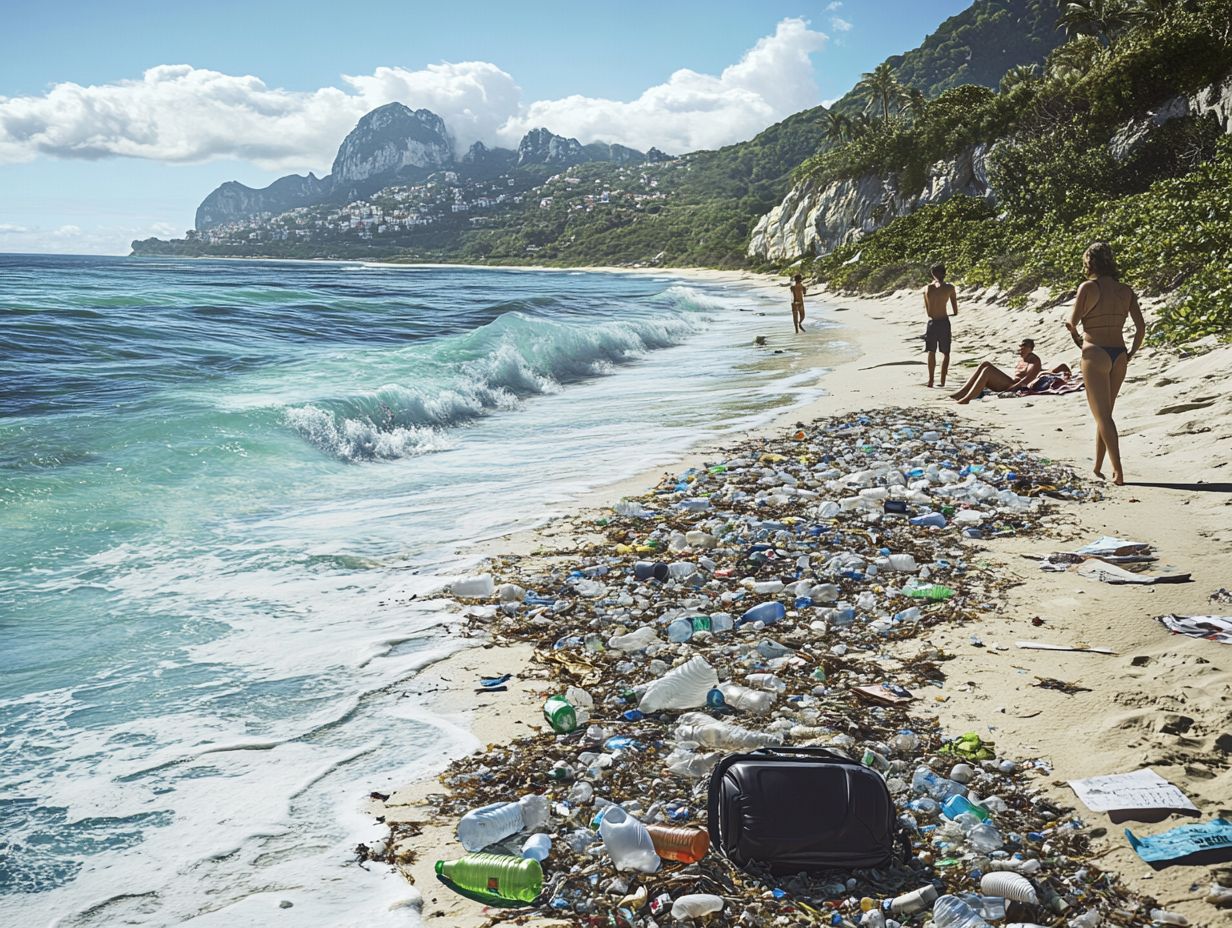
While tourism offers undeniable benefits, it’s essential to recognize its significant negative impacts on the environment, particularly in sensitive areas like the Great Barrier Reef, where rising sea levels and habitat destruction are pressing issues.
The rapid growth of tourism can lead to habitat destruction, a rise in carbon emissions from transportation, and pollution stemming from inadequate waste management. Rising sea levels also pose a threat to these ecosystems.
We need to reevaluate tourism practices to mitigate harm and promote sustainability.
Environmental Degradation and Pollution
Environmental degradation and pollution are pressing issues that tourism exacerbates. With increased foot traffic and the operation of cruise ships, waste management challenges and high levels of greenhouse gas emissions emerge.
Destinations like Bali and Nepal are particularly susceptible, as the surge in tourists can overwhelm local infrastructure and deplete the natural resources vital for supporting local communities and biodiversity. Addressing these challenges is crucial for safeguarding both the environment and the quality of the tourist experience.
The pollution generated by tourism is complex, prominently featuring plastic waste that tarnishes picturesque landscapes and harms marine ecosystems, along with significant air pollution from various transportation methods.
These pollutants pose real threats to local ecosystems, jeopardizing wildlife habitats and diminishing water quality.
Given these urgent concerns, case studies from locations like Costa Rica showcase effective strategies. Implementing strict regulations on plastic use and promoting eco-friendly transportation options are steps taken to prioritize environmental preservation.
Such initiatives not only enhance the sustainable appeal of these tourist hotspots but also bolster waste management practices, fostering a harmonious balance between tourism growth and ecological protection.
Ways to Mitigate the Negative Effects
Mitigating the negative effects of tourism is crucial for preserving the environment and fostering sustainable growth. Responsible tourism practices stand out as a compelling solution.
By embracing sustainable tourism practices, you and other travelers can significantly lower your carbon footprint while championing eco-friendly initiatives that bolster local communities and protect biodiversity, combating issues such as biodiversity loss.
This approach includes responsible waste management, carbon offsetting programs, and the promotion of renewable energy sources within tourism operations.
Join the movement to protect our planet through responsible tourism!
Sustainable Tourism Practices
Sustainable tourism practices are essential for minimizing your environmental impact and embracing responsible travel. This allows you to explore breathtaking destinations while preserving their cultural heritage and natural resources.
These practices include various strategies, such as tourism that involves local communities in places like Costa Rica, where local families open their homes to visitors. This offers a chance for authentic cultural exchanges while directly supporting the local economy.
In Bhutan, there’s a fascinating approach that intertwines tourism with conservation, embodying a policy of high-value, low-impact tourism. This ensures environmental preservation while benefiting the local populace.
As a traveler, you can make a huge difference by making conscious choices. Opt for eco-friendly accommodations, support local artisans, and engage in wildlife conservation programs.
The ripple effect of these responsible tourism practices enriches your travel experience and uplifts the living standards of local communities, safeguarding their rich heritage for future generations.
Future of Tourism and the Environment
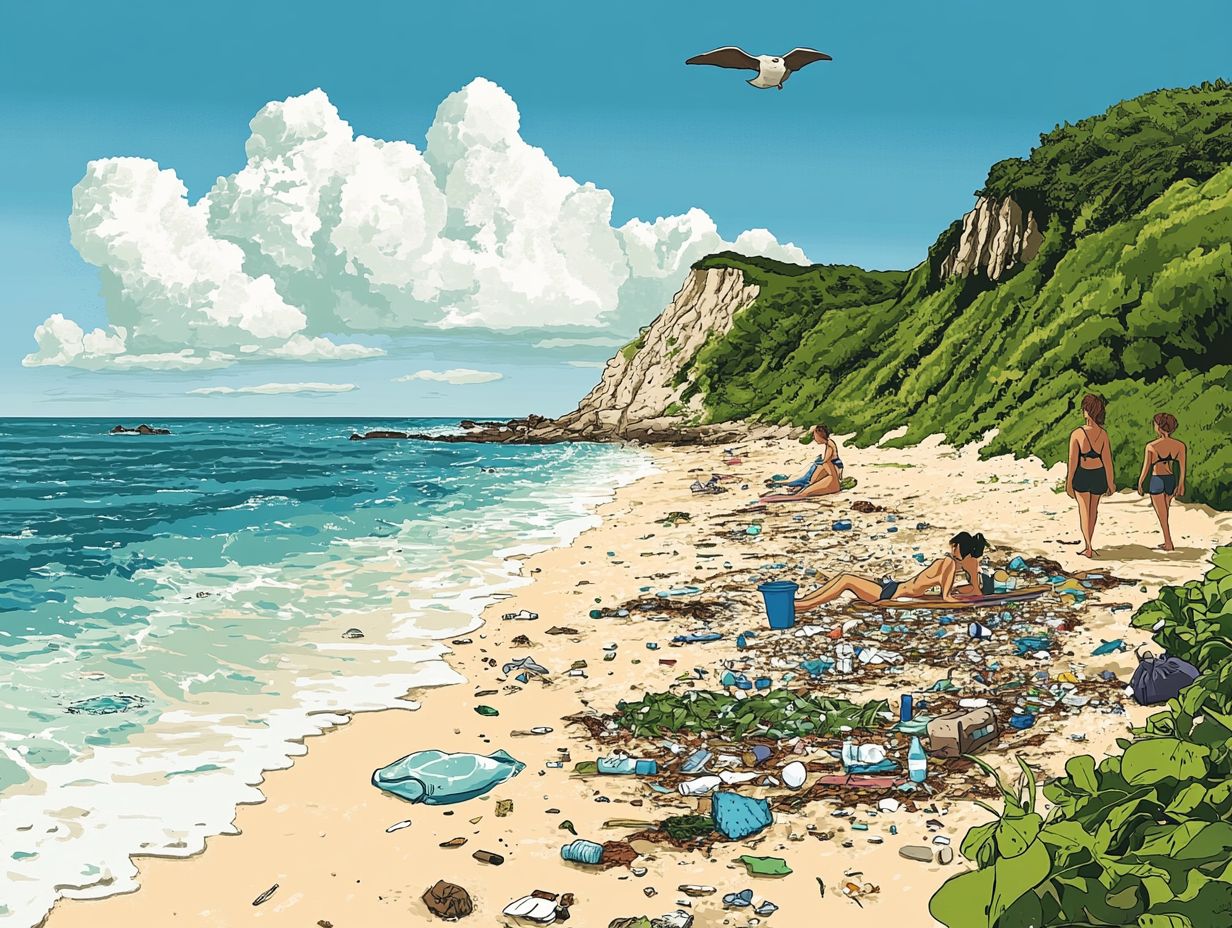
The future of tourism is intricately linked to the health of our environment. Experts predict that sustainable growth will be essential as we navigate the challenges posed by climate change and environmental degradation.
Moving forward, prioritize eco-friendly practices as industry stakeholders. By doing so, you can protect fragile ecosystems and ensure that tourism remains a sustainable economic driver for local communities.
This commitment to sustainability will enhance the experiences you offer travelers and redefine the overall impact of tourism on our planet.
Predictions and Solutions for Sustainable Growth
Predictions for the future of tourism emphasize the necessity of adopting solutions that foster sustainable growth while minimizing environmental impact on vulnerable ecosystems globally. As climate change accelerates, you, as part of the tourism industry, must innovate and embrace sustainability-focused strategies, such as renewable energy (energy from sources that can be replenished, like sunlight or wind), waste reduction techniques, and community engagement initiatives, to ensure that tourism thrives without compromising ecological integrity.
This journey requires a multifaceted approach that prioritizes eco-friendly practices and nurtures a genuine connection between you and the communities you visit. For instance, consider implementing solar energy solutions in hotels and promoting eco-tours; these actions can significantly reduce carbon footprints (the total greenhouse gas emissions caused by an individual or organization). Engaging in community-based tourism allows you to immerse yourself in local cultures, support small businesses, and help preserve traditions.
By addressing the environmental challenges linked to mass tourism, you can play a pivotal role in paving the way for a more sustainable industry that benefits both nature and people alike.
Frequently Asked Questions
What Impact Does Tourism Have on the Environment?
Tourism can have both positive and negative impacts on the environment, depending on how it is managed and implemented.
How does tourism affect the local ecosystem?
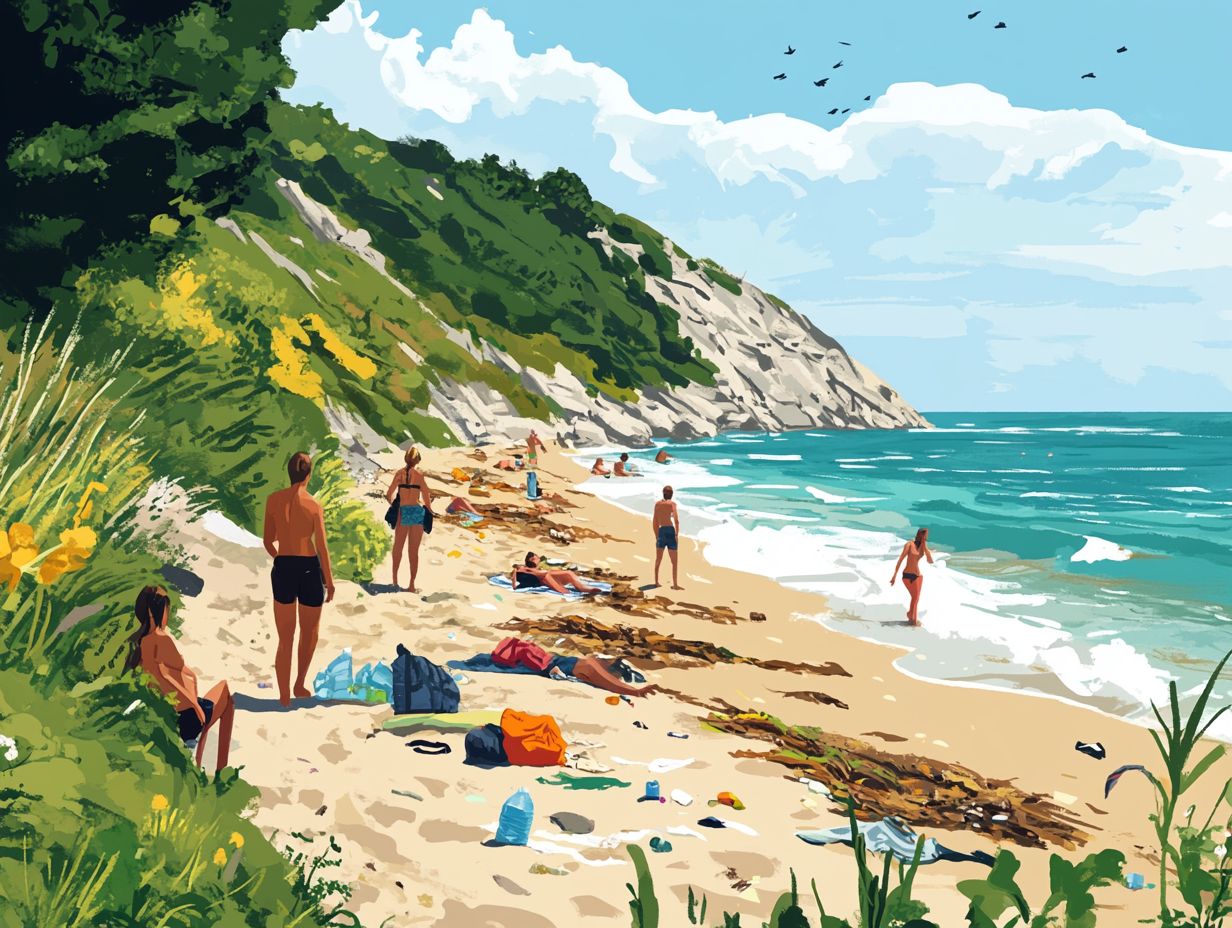
Tourism can disrupt the balance of the local ecosystem through activities such as overdevelopment, pollution, and damage to natural habitats.
What are some ways that tourism can have a positive impact on the environment, especially in places like Costa Rica and Bali?
Tourism can contribute to conservation efforts through sustainable practices, promoting environmental awareness, and supporting eco-tourism initiatives.
Join the movement for sustainable tourism today and make a lasting impact!
How does transportation in tourism impact the environment, especially cruise ships and their greenhouse gases?
Transportation in tourism, like airplanes and cruise ships, contributes to air and water pollution. These vehicles release gases that trap heat in the atmosphere, worsening climate change.
What are the long-term consequences of unsustainable tourism on the environment?
Unsustainable tourism can cause irreversible damage to natural resources and habitats. This leads to the loss of biodiversity and disrupts local communities.
How can we reduce the negative environmental impacts of tourism?
Let’s take action! Individuals and businesses can adopt sustainable practices that protect our planet. Supporting responsible tourism initiatives and educating travelers about environmental conservation is crucial.

